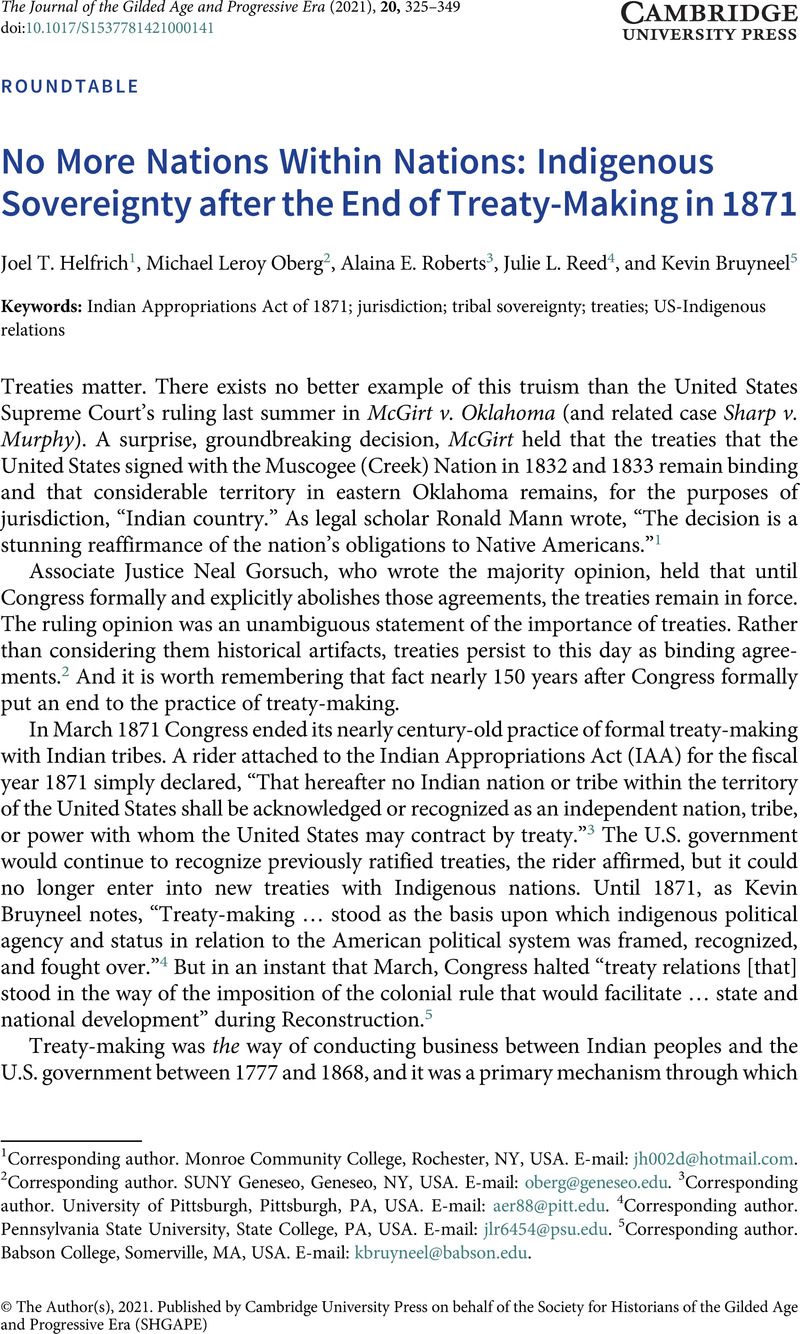No CrossRef data available.
Article contents
The Way Things Matter
Published online by Cambridge University Press: 22 April 2021
Abstract

Information
- Type
- Roundtable
- Information
- The Journal of the Gilded Age and Progressive Era , Volume 20 , Issue 2 , April 2021 , pp. 330 - 332
- Copyright
- © The Author(s), 2021. Published by Cambridge University Press on behalf of the Society for Historians of the Gilded Age and Progressive Era (SHGAPE)
References
Notes
1 “Abolition of Treaty-Making, Mar. 3, 1871” in Prucha, Francis Paul, ed., Documents of United States Indian Policy, 3rd ed. (Lincoln: University of Nebraska Press, 2000), 135.Google Scholar
2 Prucha, Documents of United States Indian Policy, 133.
3 Hoxie, Frederick E., ed., Talking Back to Civilization: Indian Voices from the Progressive Era (Boston: Bedford/St. Martin’s, 2001).Google Scholar
4 Hauptman, Laurence M., The Iroquois and the Civil War (Syracuse: Syracuse University Press, 1980), 57–58;Google Scholar Armstrong, William H., Warrior in Two Camps: Ely S. Parker, Union General and Seneca Chief (Syracuse: Syracuse University Press, 1978), 137–65;Google Scholar Genetin-Pilawa, C. Joseph, Crooked Paths to Allotment: The Fight over Federal Indian Policy after the Civil War (Chapel Hill: University of North Carolina Press, 2014), 25–26, 84–87.Google Scholar
5 On this point, see Justice Thomas’s concurring opinion in U.S. v. Lara, 541 US 1993 (2004) and, generally, Martin, Ray, “Justice Scalia and Tonto Fistfight in Heaven,” American Indian Law Journal 5 (2017): 697–731 Google Scholar; Ball, Dewi Ioan, The Erosion of Tribal Power: The Supreme Court’s Silent Revolution (Norman: University of Oklahoma Press, 2016).Google Scholar
6 The principal collection of treaties is Charles Kappler, comp., Indian Affairs: Laws and Treaties (Washington, DC: Government Printing Office, 1904). On the general history of Indian treaties, see Calloway, Colin G., Pen and Ink Witchcraft: Treaties and Treaty-Making in American Indian History (New York: Oxford University Press, 2013)Google Scholar; Prucha, Francis Paul, American Indian Treaties: The History of a Political Anomaly (Berkeley: University of California Press, 1994).CrossRefGoogle Scholar
7 Cherokee Nation v. Georgia, 5 Peters 1 (1831). The “plenary power” doctrine appeared in a number of cases, but in none more starkly than Lone Wolf v. Hitchcock, 187 U.S. 553 (1903).
8 Oberg, Michael Leroy, Peacemakers: The Iroquois, the United States, and the Treaty of Canandaigua, 1794 (New York: Oxford University Press, 2015)Google Scholar; Hauptman, Laurence M., Conspiracy of Interests: Iroquois Dispossession and the Rise of New York State (Syracuse: Syracuse University Press, 1999)Google Scholar.
9 Chancellor Sims’s efforts are chronicled in box 10 of the Charles N. Sims Papers, 1859–1939, housed at the Ernest Stevenson Bird Library Special Collections, Syracuse University, Syracuse, NY. The efforts of the Commission he headed are covered in “The Onondaga Indians,” The Brooklyn Daily Eagle, Jan. 21, 1883; The Sun (New York), Jan. 12, 1884; “A Description Which Does Not Flatter the Tribe,” New York Times, July 10, 1888. For the Whipple Committee Report, see Assembly Document No. 51, Report of the Special Committee to Investigate the Indian Problem of the State of New York, 2 vols. (Albany: Troy Press, 1889).
10 Report of the Commission, Chancellor Charles N. Sims Collection, box 10, Ernest Stevenson Bird Library, Syracuse University, Syracuse, NY.
11 “Six Nations Opposed,” Buffalo Courier, Feb. 13, 1902; “Threats by Indians,” Buffalo Commercial, Mar. 6, 1902.
12 “Indians to Declare War Upon Germany,” Post-Standard (Syracuse), Aug. 1, 1918; “Onondaga Indians Will Make War Against Huns,” Democrat and Chronicle (Rochester), Aug. 1, 1918.
13 “Indians Reject Offer of the President for Citizenship Rights,” Ithaca Journal, July 10, 1924.
14 Hauptman, Laurence M., The Iroquois and the New Deal (Syracuse: Syracuse University Press, 1981), 56–69 Google Scholar; Hauptman, Laurence M., The Iroquois Struggle for Survival: World War II to Red Power (Syracuse: Syracuse University Press, 1986), 1–14.Google Scholar

